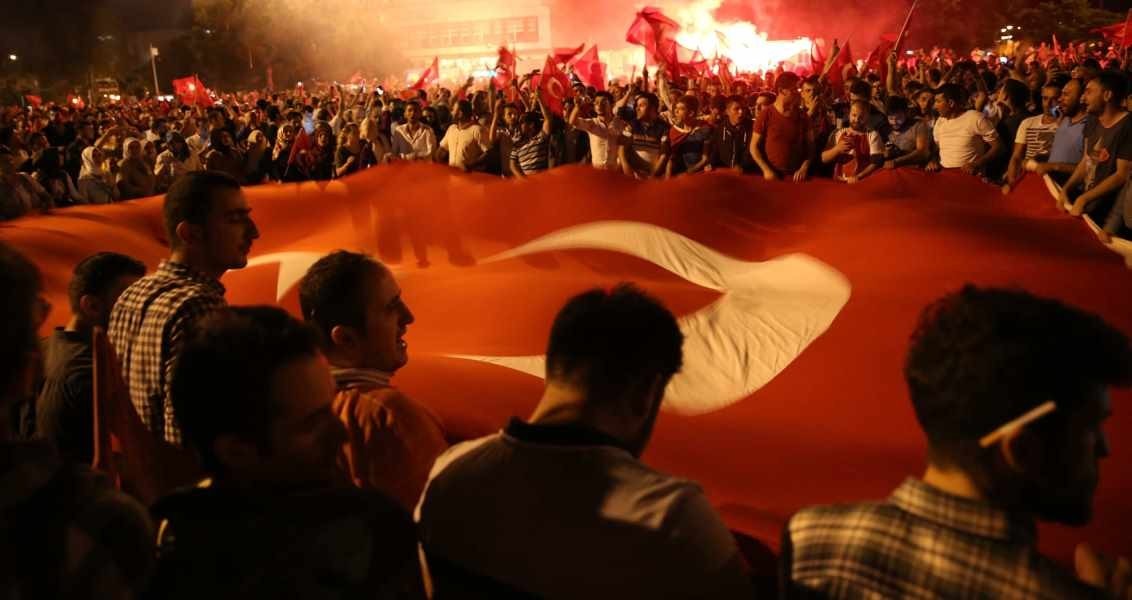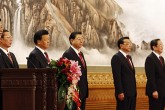Last week, I traveled to Hamburg, Germany for the G20 summit. The city was partially shut down as tight security measures were enforced by some 20,000 police officers. At some point, seven or eight police helicopters were hovering over the conference site and sirens were blaring throughout Germany’s trade hub.
Arriving at Hamburg to attend what the protesters considered a gathering of evil capitalists, world leaders saw banners that read “Welcome to Hell” waved by angry mobs. Anti-Putin, anti-Trump and anti-Erdoğan posters decorated the walls – one of them even urging people to kill the Turkish president.
Motorcades make frequent stops as police officers used tear gas to disperse crowds and conduct detailed searches to showcase the power of the German state.
One can’t help but wonder why the German government thought it was appropriate to hold the G20 summit in downtown Hamburg. The most recent summits took place in relatively calm areas in Turkey and China. Then we talk about the symbolic value of bringing the G20 to Hamburg, Angela Merkel’s hometown, ahead of the September 2017 elections. Yet, everyone was complaining about having to spend time in a town where even walking around was a hassle.
The German media followed the event quite closely as well. A number of stories and op-eds appeared in local newspapers criticizing Trump, Putin and Erdoğan. But it’s been virtually impossible to notice the emphasis on Turkey. After all, launching personal attacks against Erdoğan has been a central theme in German politics in recent years. Perhaps anti-Erdoğanism has become even more important as it started to affect the definition of German identity in a country with 3 million native Turks. On Friday, it was surprising to see the contributions of the Justice and Development Party’s (AK Party) opponents in the German media. The level of attention shown by newspapers to a foreign country was surprising to say the least.
A list of all their complaints could make up an entire paragraph: The European Parliament’s recommendation to suspend EU membership talks with Turkey, the potential confrontation between the “justice” march and the democracy watch event, an interview with main opposition leader Kemal Kılıçdaroğlu where he charges Erdoğan with dictatorship, the detention of certain human rights activists in Turkey, the ongoing detention of German national Deniz Yücel and accusations by the speaker of the German Parliament and the head of the Parliament’s Foreign Affairs Committee.
The German media’s hostile coverage makes me think about Istanbul. I recall that the “justice” march, backed by the Gülenist Terror Group (FETÖ) and Peoples’ Democratic Party (HDP), was open to provocations. I am alerted by the arrests of Daesh terrorists planning an attack against the event. I think back to a conversation I had at a hotel lobby, where I was told that Daesh had instructed its militants to attack supporters of the Republican People’s Party (CHP) and the HDP, including Alevis and Kurds. I pray that the irresponsible march launched by Kemal Kılıçdaroğlu, who says he has prepared to pay any price, ends in Istanbul peacefully.
As the helicopters continue to hover over Hamburg, I think about the nation’s glorious resistance to the coup plotters last summer and the upcoming anniversary of July 15. I remember the sacrifice of ordinary citizens who turned the Bosporus Bridge into a land of martyrs.
As the endless noise of helicopters and police sirens mingles with the sound of drums beaten by protesters, my body is in Hamburg but my mind is off to Istanbul.
[Daily Sabah, July 10, 2017]
In this article
- Foreign Policy
- Opinion
- 2017
- Angela Merkel
- Anti-Erdoğanizm
- China
- DAESH
- Daily Sabah
- Donald Trump
- Elections
- EU Membership
- Europe
- European Parliament (EP)
- European Union (EU)
- Fethullah Gülen
- Fethullah Terrorist Organization (FETÖ)
- G20
- Germany
- Gulen Community
- Gülen Movement
- Gülenist Terror Group
- Gülenist Terror Organization
- Hamburg
- Hizmet Movement
- Human Rights
- Kılıçdaroğlu
- Merkel
- Opposition
- Recep Tayyip Erdoğan
- Terror
- The President of the Republic of Türkiye
- Turkish President
- Türkiye's Justice and Development Party | AK Party (AK Parti)
- Türkiye's Peoples' Democratic Party (HDP)
- Türkiye's Republican People's Party (CHP)
- Vladimir Putin



